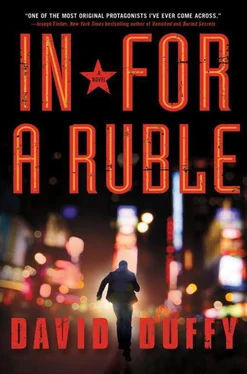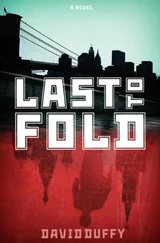“You assume that whoever placed the bug is working for a rival bidder.”
“That seems obvious, doesn’t it?”
“Possible, maybe even probable. But, as I said, no evidence.”
“What else, then?”
“You’re looking at this from your perspective. That’s not where the bad guy’s coming from. He—or she—is doing what he’s doing for his own reasons. His perspective, hers maybe, not yours, is the one that’s relevant.”
“What are you suggesting?”
“Only what I said. Be careful about assumptions.”
“IT’S AN OPPOSING BIDDER!”
I shrugged. I wasn’t going to win the argument, and I didn’t really care much whether I did.
“I need your help,” Leitz said.
“I’ve done what we agreed.”
“I know. But you can find the bastards. I’ll take it from there.”
“Not that easy.”
Foos felt my ambivalence. “That wasn’t the agreement, Sebastian.”
“Find the bastards,” he said. “Just tell me who they are. Give me a name.”
“Arrogance talking,” I said.
I expected fire but I got a hard, level stare from the kidney pools.
“A good trader always knows what he can get from a deal,” Leitz said.
“A good card player knows when the price of seeing the next card is too high.”
“I’m prepared to pay for the help I’m asking. State your price.”
I don’t know why I did it. Maybe because I was already in. Maybe because I knew I wasn’t going to allow Nosferatu to get away with beating me up. Maybe because a guy like Leitz gets the competitive juices flowing. I was in the game, and I wasn’t about to fold, especially when I held a couple of aces, including one up the sleeve. Maybe just because I finally was intrigued and didn’t have anything better to do for the next few days. Or maybe because I too, found myself in a position to get something I never dreamed of. I might have told Leitz those are good times to think twice, go home and sleep it over.
I put down my next bet. “One million dollars. And the Malevich.”
That caught him by surprise. The kidney pools widened. He started to shake his head.
I said, “Hear me out.”
He stopped.
“One million dollars, cash—if I’m successful. Plus, the Malevich—four months, one third of the year, on loan, in perpetuity. You own it, I get to enjoy it, part of the time. You sell it, that’s your prerogative, but I get ten percent as compensation for loss of use.”
The laugh that exploded across the room almost blew both Foos and me through the frosted glass. Foos steadied his feet and smiled.
When the laugh softened to a chuckle, Leitz said, “You’d make a good trader. You’ve got creativity—and chutzpah. But you’re trying to take advantage of having me over the proverbial barrel.”
“And when you’re about to clip some guy on the other side, you stop, revisit the Golden Rule, tell yourself that’s not the Christian thing to do, and walk away?”
He was still smiling. “Touché. But what you want is too complicated. The insurance alone…” He shook his big head. “It’ll never work.”
Mathematicians are good card players because they can calculate odds. They’re not always the best psychologists.
“That’s it then. Good luck.” I looked at Foos. “See you back downtown.”
I was out on the trading floor when Leitz called, “Wait!”
I returned to the door.
“You’d walk out on a million dollars?” he said.
“A prospective million. I have to find the guys who bugged you to earn it. That won’t be easy, as I said. But, yes, and here’s why: My last client paid me seven hundred thousand to find his daughter, who was never really missing to begin with, and now wishes he never met me. His wife was murdered, the girl’s a borderline basket case, and he’s got one foot in the slammer, although that’s not my fault. It ended badly for everybody—including me. I lost something more valuable than money. The fee wasn’t enough. I’m sorry to tell you, this has a similar feel.”
I had to hand it to him, he didn’t hesitate. I think he was almost smiling. “Okay. But, the Malevich…?”
“You didn’t listen to what I just said. I’ve already been beaten up once on your nickel. I’m going to be compensated on my terms in ways that satisfy me, however difficult and complicated. If that doesn’t make sense to you, I’m sorry. One more thing, while we’re at it—if you really want my help, I go about things as I see fit. You hire me, I’m in to the finish. I talk to whomever I want. I find whomever bugged your computers, I earn my fee. What happens with your TV bid, or your other affairs—that’s your concern.”
He hesitated this time. I turned to go.
“Stop,” Leitz said.
I turned back one more time.
He said, “Tell me this. You charged the last guy seven hundred thousand. You want a million from me, plus the Malevich. What’s the difference?”
My turn to smile. “The last guy didn’t try to crush my legs under his conference table. You get a hazard premium.”
I should have kept walking. To think I could find the guys who bugged Leitz was my own brand of hubris. To think I could find them without suffering consequences was hubris squared. Then again, to think I began to understand what I was getting into was blind stupid. We have another proverb—every fox praises his own tail.
Foos said, “You still playing him?”
“Some. This was an inside job. The data trail you found. The guy who bribed the cleaner knew the office layout, told him where to place the bug. Employee, client, family, friend, someone Leitz does business with.”
Leitz hadn’t wanted to hear any of that. I’d mostly dismissed the employee possibility on the grounds that he or she wouldn’t need the risk of involving a third party. Leitz confirmed he’d only lost two staff in the last year, neither on bad terms. Clients rarely, if ever, visited the office. Vendors were a possibility, but Nosferatu would have had to obtain a list from somewhere. I asked about the bankers and lawyers descending at 11:30.
“All trusted advisers,” he said.
“All potentially for sale. Put the trading floor and all offices off limits. Have them escorted from the elevator to the conference room and back again.”
He didn’t like that idea either, but he said he’d follow my advice.
I broached the subject of family.
“IMPOSSIBLE!” he shouted, temperature headed skyward. “Don’t even… None of my…”
“Any of them pissed off at you?”
“OF COURSE NOT!”
That answer came too fast.
“Anybody under pressure, financial, personal or otherwise?”
“NO!”
Much too fast. I shook my head. “You’re not being candid. That’s not going to help them or me.”
“Chill, man,” Foos said to his friend. “All in the Big Dick anyway.”
Leitz looked from me to him. Big Dick is Foos’s nickname for what he calls the Data Intelligence Complex, the network of computers and databases—government and private—that store just about everything we do that involves anything electronic, from our purchases and paydays to our dental records and divorces. It is all there—death and taxes too.
Leitz looked back and forth between us again.
“We are a normal family,” he said, spacing every word. “We’ve had… adversities, like any other family, but we’ve overcome them. Nobody would…”
He left the sentence hanging and just shook his head at the impossibility of familial duplicity. Even geniuses have a hard time facing the prospect of betrayal.
“Sometimes, people don’t have any choice,” I said. “They’re forced to do things they don’t want to. Anybody have legal troubles, marital problems, need money?”
Читать дальше












